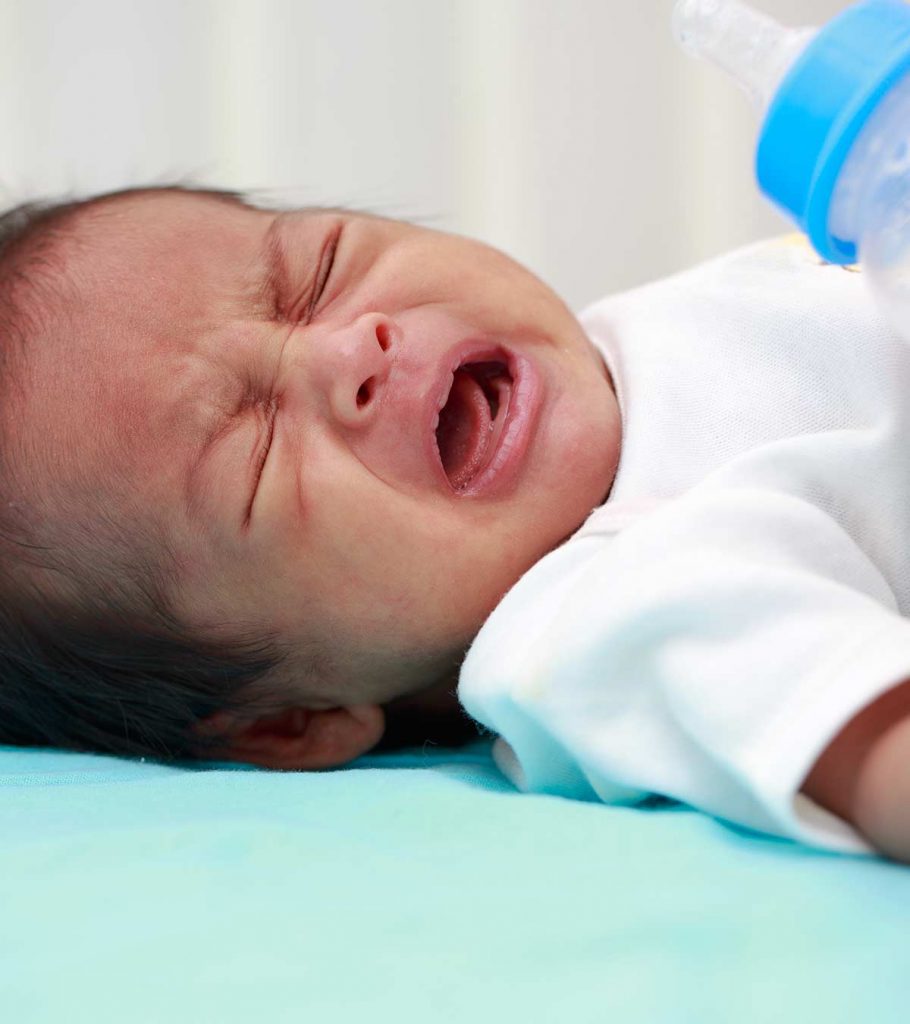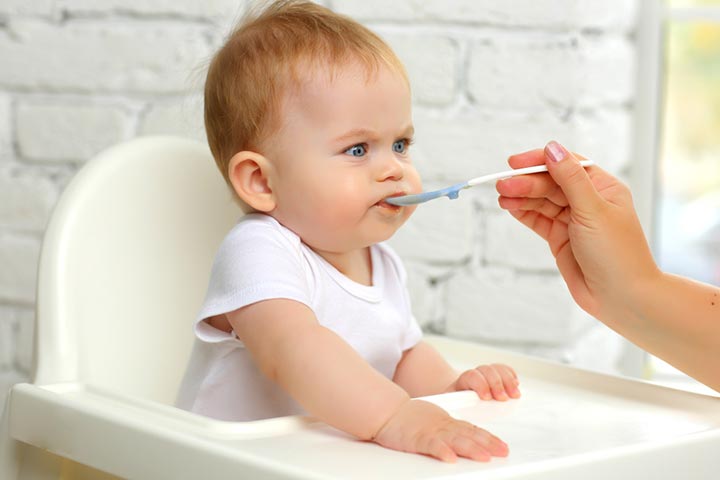Anorexia in infants occurs due to a poor appetite or complete loss of appetite. Infantile anorexia, or anorexia in infants, is when the baby refuses to eat adequate food for at least one month, shows growth deficiency, and has visible feeding difficulties. They also do not communicate hunger and lack interest in food, which may lead to growth retardation or undernourishment. The baby’s refusal to eat need not follow a traumatic event or be due to underlying medical illness (1). Infantile anorexia is also different from anorexia nervosa, which often occurs in adults and adolescents due to fear of gaining weight. This post explains the causes, signs, and ways to manage infantile anorexia.
When Does Infantile Anorexia Occur?
Infantile anorexia may begin at any point in time during the first three years of the baby’s life. However, some research studies state that it more commonly arises between nine and 18 months of age. It could be because the phase marks the transition to spoon-feeding and then to self-feeding (2). However, not all babies develop infantile anorexia during the transition phase.
Signs Of Infantile Anorexia
The following are the commonly observed symptoms in babies who develop infantile anorexia(3)(4).
- Consistently refuses food for at least a month
- Never communicates hunger
- Throws food-related tantrums
- Stops eating after a few bites
- Does not gain weight or is low weight
- Shows weight loss as compared to other babies of the same age (failure to thrive)
- Shows indications of malnutrition
- Gets distracted with play during mealtimes
Some babies also exhibit sensory food aversion (SFA) along with infantile anorexia. In this condition, the babies might only eat a certain food that has a specific taste, temperature, consistency, texture, and smell. They do not try new foods and are very particular about the kind of food they eat.
When the baby is coaxed to try new food, they might make faces, spit, gag, or vomit. Such babies exhibit phenomena like oral aversion or food refusal to specific food groups, which increases the risk for nutritional deficiencies and digestive problems. However, when offered their preferred food, the children eat it without difficulties and usually do not show growth failure, or even may become overweight (3).
Causes Of Infant Anorexia
Research suggests that the cause of infantile anorexia is often related to the baby’s emotional needs and parental conflict. The following are some salient points about the likely reasons behind the development of infantile anorexia(5).
- As the baby grows, he/she begins to develop autonomy, which is the condition of self-governance. In this phase, babies want to make their own decisions, including their choice of food.
They deliberately refuse food in order to gain maternal attention towards their needs.
- Factors like maternal depression and maternal eating disorders can also cause infantile anorexia in babies. Depressed mothers have shown less positive engagement while feeding the child. All this can harm the emotional condition of the baby, and the baby might decline to eat food, leading to potential developmental delays (6).
- Babies growing up in dysfunctional families or babies non-optimal caregiving system may increase the risk of infantile anorexia (7).
Emotional reasons and parent’s behavior towards feeding are significant reasons behind infantile anorexia. If you suspect your baby has anorexia, it is good to see a doctor or a dietician who may provide specific dietary guidance for your little one.
Treatment Of Infantile Anorexia
Timely treatment of infantile anorexia is essential for preventing severe nutritional deficiencies in babies, which may necessitate hospitalization.
Timely treatment of infantile anorexia is essential for preventing severe nutritional deficiencies in babies. There are three major treatment pathways that can help the baby come out of infantile anorexia (3).
- Encouraging the baby to identify and convey the inner cue of hunger as well as satiety.
- Encouraging the baby to consume different types of food and providing whole foods.
- Ensuring adequate energy and nutritional intake.
The nutritional care for babies with infantile anorexia focuses on designing a refeeding plan by providing nutritional support that satisfies the following areas (3)
- Providing the required energy levels for healthy physical activity and new tissue deposition and formation
- Providing an appropriate diet for the age and developmental requirements
- Encouraging the baby to self-feed
- Gradually making the baby less dependent on liquid calories and nutritional supplements
While making these changes, the baby should be monitored for any changes in body weight, any other digestive issues, such as diarrhea or constipation.
If the doctor detects parental conflict as a cause of infantile anorexia, then the following measures might be suggested (8).
- If constant friction between the mother and the baby is the main cause, then the father’s intervention may be recommended. The baby’s father can work as a compensative or balancing factor between the mother and the baby. It might encourage the baby to try a wider array of nutritious food.
- The mother is counseled about the issue with the child and asked to tolerate the difficulties of the weaning phase.
- If the mother is too anxious or the parents are experiencing other emotional issues, they might be advised to seek psychiatric or psychological counseling.
The treatment of infantile anorexia can involve the use of multiple modalities for a complete recovery and prevention of relapse.
Tips To Help Your Infant Feed Better
You can follow these tips and note if you see any positive changes in your baby’s feeding habits (4).
- Let the child feel hungry by himself/herself.
- Space out the meals throughout the day. Give them food at a gap of three to four hours and give only water in between.
- Introduce finger foods.
- Give them small portions of food and let them ask by themselves for a repeat serving.
- Encourage them to sit on the dining table till “mommy” and “daddy” have their tummies full. A baby who learns to sit patiently may eat better.
- A single meal session should not last for longer than 30 minutes, even if the baby has not eaten enough.
- Appreciate your baby when they eat by themselves but do not use the consumed food quantity as a measure to encourage or discourage the child.
- Do not allow any distractions like electronic media, books, toys, etc., while feeding them. It might only work temporarily and will not help the baby learn or understand the inner cues of hunger and satiety.
- Do not bribe a baby by saying that you might give them something if they finish their meal.
- Discourage them from playing with food.
- If they throw a tantrum or try to jump out of the chair, then warn them. If they continue the behavior, give a “time-out”. Time-out is when your child is removed from the place where the misbehavior happened. Your child is away from all the fun things, and they do not get any attention from anybody in the family during a time-out. It is a zero-attention time. Time-out works to change problematic behavior since children don’t usually like to be bored (9).
Can Anorexia Be Genetic?
Studies show that anorexia runs in families. Researchers have also identified a couple of genes that might be associated with anorexia. Mothers with anorexia might be more likely to have babies who develop infantile anorexia. However, it is not necessary that every mother who is anorexic will have a baby with infantile anorexia. Discuss with your pediatrician if you fear your baby developing anorexia (10).
Anorexia in infants is the loss of appetite wherein the child refuses to consume any food. They are never fed an adequate amount as they get irritable and intolerant after a point. It can be highly challenging to ensure that the nutritional requirements of such children are being taken care of. However, you can try different methods of feeding the little one. Parents usually end up scolding, but some other ways are distracting the child or punishing them. You may also try offering their favorite food. Lastly, you must be patient and deal with it peacefully.
Key Pointers
- Infantile anorexia (appetite loss) usually occurs within the first three years of a baby’s life.
- If the mother had a history of anorexia, her baby is more likely to develop the condition.
- Refusing food, malnourishment, weight loss, and not communicating hunger are common signs of infantile anorexia.
- Feeding various types of food, encouraging babies to communicate hunger cues, and teaching self-feeding can help deal with the condition.
- Parents may initially begin by giving finger foods in small portions to encourage a baby to eat.















